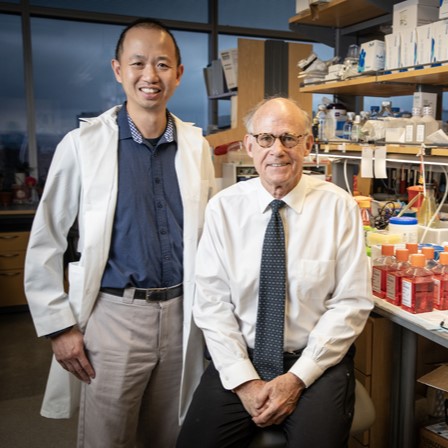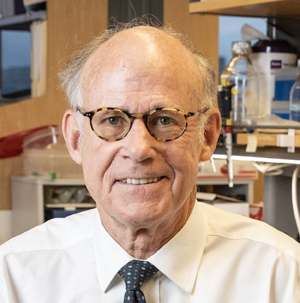Gastrointestinal_Cancer_Research_Program News

|
New members of Academy for Excellence in Clinical Medicine selected Vanderbilt University School of Medicine Academy for Excellence in Clinical Medicine (AECM) has selected 25 new members. Friday, December 15th, 2023 |

|
Colorectal cancer 'cartography' reveals an avenue to improved immunotherapy Vanderbilt University Medical Center researchers have discovered why most colorectal tumors escape detection and destruction by the body's immune system. Monday, December 11th, 2023 |

|
Vanderbilt research presented at Cancer Moonshot meet Vanderbilt Colorectal cancer expert Bob Coffey, MD, was recently invited to present his research to representatives of President Joe Biden’s reignited Cancer Moonshot initiative. Friday, December 8th, 2023 |

|
Potential biomarker for IBD severity, cancer risk identified A selenium transport protein produced in the colon is underexpressed in patients with ulcerative colitis and helps protect against colitis-associated cancer in an animal model, Vanderbilt investigators have discovered. Thursday, February 4th, 2021 |

|
New drug for metastatic colorectal cancer enters phase 3 trial A new therapy for metastatic colorectal cancer that has been granted fast track designation by the U.S. Food and Drug Administration is being tested in a phase 3 clinical trial at Vanderbilt-Ingram Cancer Center. Wednesday, November 18th, 2020 |

|
VUMC study sheds light on gastric cancer development VUMC researchers have created the world’s first laboratory model of precancerous changes in the lining of the stomach, a scientific tour de force that is helping to unlock the mysteries of gastric cancer development. Friday, January 17th, 2020 |

|
New Physician Spotlight: Cathy Eng Cathy Eng, MD, a national and international leader in gastrointestinal medical oncology, was recruited to VUMC from The University of Texas MD Anderson Cancer Center in Houston. Friday, November 1st, 2019 |

|
A step toward gastric cancer New research findings provide insight into the detrimental events that develop in response to H. pylori infection. Thursday, October 3rd, 2019 |

|
Bailey to direct general surgery residency program Christina Bailey, MD, MSCI, assistant professor of Surgery, has been named the new program director of the general surgery residency training program in the Department of Surgery, Section of Surgical Sciences. Monday, September 9th, 2019 |

|
Colorectal cancer researchers receive SPORE funding Colorectal cancer researchers from Vanderbilt-Ingram Cancer Center (VICC) have been awarded a Specialized Program of Research Excellence grant from the National Cancer Institute (NCI). Saturday, August 31st, 2019 |

|
Protein’s role in inflammation-related cancer studied Investigators are exploring the molecular mechanisms behind the association of chronic inflammation and colon cancer. Friday, August 30th, 2019 |

|
Pancreatic cancer clue Inflammation synergizes with a cell’s intrinsic genetic program to promote the development of pancreatic cancer. Friday, August 30th, 2019 |

|
Cellular soldiers designed to kill cancer cells that get loose during surgery, stop metastasis Cellular soldiers created using the body’s own defenses can track down and kill escaping cancer cells during surgeries, preventing metastasis and saving lives, a Vanderbilt University biomedical engineer has discovered, particularly in cases of triple negative breast cancer. Friday, July 26th, 2019 |

|
SMAD4 clue to colon cancer A recent study has linked inflammation-driven carcinogenesis in the colon to loss of an important signaling protein called SMAD4. Friday, July 6th, 2018 |

|
VUMC researchers find a way to ‘starve’ cancer Researchers at Vanderbilt University Medical Center (VUMC) have demonstrated for the first time that it is possible to starve a tumor and stop its growth with a newly discovered small compound that blocks uptake of the vital nutrient glutamine. Thursday, January 18th, 2018 |

|
Researchers find novel mechanism of resistance to anti-cancer drugs The targeted anti-cancer therapies cetuximab and panitumumab are mainstays of treatment for advanced colorectal cancer, the second leading cause of cancer-related deaths in the United States. However, many patients have tumors with genetic mutations that make them resistant to these anti-epidermal growth factor receptor (EGFR) monoclonal antibodies, or the cancers develop resistance during treatment. Friday, October 20th, 2017 |

|
Coffey lands major NCI award to support colorectal cancer research Vanderbilt’s Robert Coffey Jr., M.D. Friday, June 9th, 2017 |

|
Study takes 3-D perspective on colorectal cancer Despite dramatic recent advances in treatment, colorectal cancer killed more than 49,000 Americans last year, according to the National Cancer Institute, making it the second most lethal malignancy after cancers of the lung and bronchus. Determined to reduce the death toll, researchers at Vanderbilt University Medical Center recently put on their 3-D “glasses” and took […] Friday, March 24th, 2017 |

|
Singer’s concert honors care received at Cancer Center A cancer patient’s gratitude toward his Vanderbilt-Ingram Cancer Center (VICC) physician led to a star-studded concert to benefit the Cancer Center. Colon cancer survivor and country artist Wade Hayes was joined by six-time CMA and ACM Female Vocalist of the Year Miranda Lambert, four-time Grammy and CMA Award-winning artist Steve Wariner and Kix Brooks, CMA […] Thursday, March 24th, 2016 |


